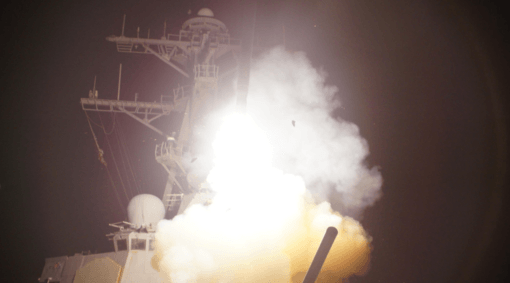
Photo by DVIDSHUB | CC BY 2.0
America must decide what it wants to do about Syria. Does it want to get rid of Bashar al-Assad? Or is defeating ISIS its most important priority?
Morally, it should do neither. America’s first priority should be to stop the war so that Syrian people do not have to die anymore.
The facts are grim. Over 400,000 Syrians are dead; 6.3 million people are homeless; another 5.1 million have become refugees; and 13.5 million Syrians need humanitarian assistance.
It is up to the United States to stop the violence. It can if it is willing to work with the Assad regime. In actuality, it has no other choice: America does not have the military muscle it needs to stop Assad from unifying his nation.
Things are beginning to look up for Mr. Assad. For one, he has the support of the Russian air force. Although Russia’s land forces are few, its air defenses are robust enough to crimp American military actions. Iran, meanwhile, bankrolls over 100,000 irregular ground troops. These soldiers in turn rely on Russian air cover when doing battle. Syria itself has 20,000 combat ready troops. Opposing Assad are 80,000-100,000 non-jihadist fighters, un-unified and scattered about Syria.
By comparison, America supports the Syrian Democratic Force (SDF), a light infantry army who do battle from the backs of their pickup trucks. The SDF has about 50,000 Kurdish and Arabic troops all told. The Kurds, especially, are good fighters, yet the SDF will always be a regional force. America will only supply them with small arms, ammunition, and machine guns; anything more will disturb Turkish relations. In addition, the Syrian Kurds are not completely trustworthy. They turned over the strategically important town of Manbij to the Assad regime after the American military helped the Kurds to capture it from ISIS last year.
The United States is using the SDF as its proxy to destroy ISIS. To “accelerate” the process, President Trump has ordered a tactical shift in how America fights ISIS. Instead of letting ISIS fighters seep through the cracks on into the countryside, America will now surround ISIS in their urban strongholds and annihilate them. This way, foreign fighters will not be able to return home and “bring their hate”.
To retaliate against US actions, ISIS will not allow area residents to evacuate during coalition air raids, causing increased civilian casualties. The Syrian Observatory for Human Rights, a non political body, documents well the bloodshed. On July 28, 40 civilians were killed in air strikes by the International Coalition in Al-Raqqah. Another 21 lost their lives by heavy allied shelling. On July 30, 20 more were killed in a bombing raid. On July 26, 31 died. Eight were children. The list goes on.
The Syrian people deserve better. The United States must drop its goal of defeating ISIS and pull its troops out of Syria. No matter how repugnant it may sound, the United States must allow the Assad regime to reunite Syria and destroy ISIS. America did something similar to China in 1949. China was then able to conserve its resources, both human and natural, and over time, improve the livelihood of its people. The same can hold true in Syria.
How will an American withdrawal play out for the Syrian people? If there is a city to retake, Assad’s army will come to an agreement with local residents. Water and electricity will be turned on, communication networks re-established, and security restored in exchange for the evacuation of rebel fighters.
The United States will take up a new role as a tribunal for the oppressed. It must pay to play, helping out with reconstruction funding and stopping the international flow of weapons. By engaging with Syria, Russia and Iran, the United States will gain a say in building up Syria’s institutions. Monitoring human rights abuses will be equally vital. As for reconstruction funding, it could go to strengthening Syrian communities—a precondition espoused by the State Department if ISIS is to not return.
Left unsaid is the security of Israel. To some extent, the civil war has benefited Israel. There have been fewer calls for it to give back the Golan Heights to Syria; plus, it is harder for Hezbollah to attack Israel if its troops are fighting in Syria. A unified Syria would take away those advantages.
Here, it is worth remembering that Israel dealt with a unified Syria before the civil war; it can come to terms with a war-torn Syria after. Giving the Syrian people a respite from war is paramount. If Israel wants better relations with its neighbors, it can return Shebaa Farms back to Lebanon, deflating much of the Hezbollah militancy.
In truth, peace can come to Syria if America wills it. It just has to work more closely with its enemies.